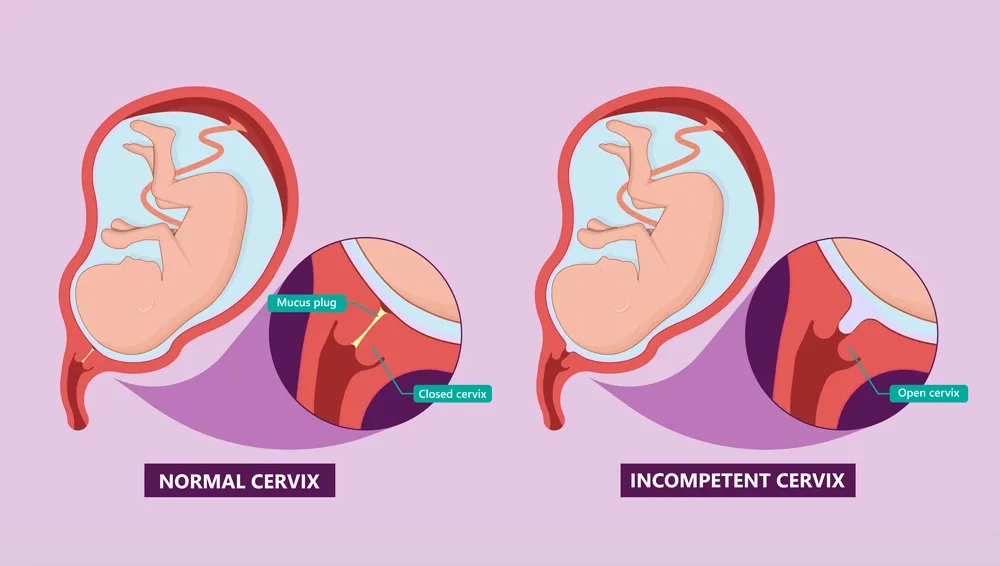What Cervical Insufficiency Means for Pregnancy
Pregnancy introduces you to a host of new terms, and sometimes it can feel like you’re learning a whole other language. One term you may come across is “incompetent cervix,” also known as cervical insufficiency. Name aside, the important thing to know is that it can have an impact on the health and longevity of your pregnancy. Fortunately, there are things doctors can do to intervene. Here’s what you need to know about having an incompetent cervix, plus what to do if you’re diagnosed with one.
Your cervix is the lower, narrow end of your uterus that forms a canal between your uterus and vagina. Before pregnancy, the cervix is typically closed and firm, explains Christine Greves, MD, an ob-gyn at the Winnie Palmer Hospital for Women and Babies in Orlando. As your pregnancy progresses and you get closer to your due date, your cervix should soften and open slightly in a process that’s known as dilation, Greves says.
Cervical insufficiency, or incompetent cervix, is a term used for a “cervix that weakens or opens too early in pregnancy, making it difficult to sustain a pregnancy to full-term,” says Jennifer Wider, MD, an author and women’s health expert. Wondering how common it is? The data is somewhat mixed, but according to Cleveland Clinic, it occurs in about 1 percent of all pregnancies.
But let’s be clear: Regardless of whether or not you develop this condition, there’s nothing “incompetent” about your cervix. “No one likes to think of a part of their body as incompetent, especially if there’s nothing they can change about its innate attributes,” says Matthew Carroll, MD, assistant professor of obstetrics and gynecology at Baylor College of Medicine. “We prefer to use the term ‘cervical insufficiency,’ which is still not the most patient-centered language.”
There are some pregnancy complications associated with cervical insufficiency. “The biggest risk is miscarriage prior to viability and after the first trimester,” Carroll says. There’s also a risk for premature delivery. And since babies aren’t typically heads down until later in pregnancy, there’s also an increased chance you’ll need an emergency c-section.
The exact causes of cervical insufficiency aren’t well understood. However, Wider says, there are a few risk factors that increase your chances of having the condition, including:
- Previous surgeries involving the cervix
- Damage to the cervix
- Being born with a misshapen cervix or uterus
- A personal history of premature birth or miscarriage in the second trimester
Cervical insufficiency usually doesn’t cause pain, says Greves. In fact, you probably won’t realize you have this issue for a while. “One of the difficult aspects of this condition is that symptoms aren’t always obvious,” says Carroll. “Eventually a person will note some increased vaginal discharge or pressure related to cervical dilation, but it can be very subtle until later stages.” According to Mayo Clinic, you may notice the following signs of cervical insufficiency starting sometime between 14 to 20 week of pregnancy:
- Pelvic pressure
- A new backache
- Mild abdominal cramps
- A change in vaginal discharge
- Light vaginal bleeding
Treatment for cervical insufficiency depends on when it’s found and how far you’re dilated, explains Greves, noting that the “goal is to try to keep you pregnant as long as possible.”
One option that may be used is a treatment called a cervical cerclage, which uses a suture to sew the cervix shut. If you have a history of second trimester loss due to cervical insufficiency, your doctor may recommend having a cervical cerclage between 12 and 14 weeks of pregnancy. Make sure your ob-gyn talks you through what this entails. “It’s not a risk-free procedure, so it’s only recommended for certain patients,” says Carroll.
Some doctors may prefer you take weekly shots of a form of the hormone progesterone called hydroxyprogesterone caproate. However, this treatment course has mixed results. Additionally, your doctor may also recommend that you limit or abstain from sex and other physical activities, notes Mayo Clinic.
Unfortunately, you can’t really prevent cervical insufficiency. “The risk factors are primarily related to previous cervical trauma or surgery,” Carroll points out, and those are often out of your control. That said, if you have a history of pregnancy loss or premature birth due to cervical insufficiency, make sure your doctor knows; they may put you on pelvic rest and recommend a cervical cerclage or other treatment to lower the risk of complications.
The good news is that having cervical insufficiency shouldn’t impact your ability to get pregnant again in the future. However, having cervical insufficiency with one pregnancy increases your risk for having it again in subsequent pregnancies—and potentially having difficulty carrying to term, Wider says.
If you have a history of cervical insufficiency, talk to your doctor about the options. They’ll likely want to start cervical length screenings via transvaginal ultrasound beginning around 16 weeks.
Whether you call it an incompetent cervix or cervical insufficiency, remember that it’s not your fault. Take comfort knowing that many people with cervical insufficiency can go on to have full-term, healthy pregnancies. For now, the best thing to do is keep up with your regular prenatal visits—and don’t hesitate to address any and all concerns with your doctor.
Please note: The Bump and the materials and information it contains are not intended to, and do not constitute, medical or other health advice or diagnosis and should not be used as such. You should always consult with a qualified physician or health professional about your specific circumstances.
Matthew Carroll, MD, is an ob-gyn and assistant professor of obstetrics and gynecology at Baylor College of Medicine in Houston. He earned his medical degree from the Mount Sinai School of Medicine in New York.
Christine Greves, MD, is an ob-gyn at the Winnie Palmer Hospital for Women and Babies in Orlando. She earned her medical degree from the University of South Florida College of Medicine.
Jennifer Wider, MD, is a women’s health expert, author and radio host. She received her medical degree from the Mount Sinai School of Medicine in New York.
Cleveland Clinic, Incompetent Cervix, October 2022
Mayo Clinic, Incompetent Cervix, April 2023
Learn how we ensure the accuracy of our content through our editorial and medical review process.
Navigate forward to interact with the calendar and select a date. Press the question mark key to get the keyboard shortcuts for changing dates.





















































